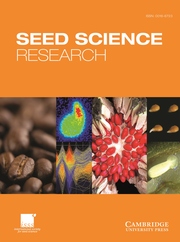Crossref Citations
This article has been cited by the following publications. This list is generated based on data provided by
Crossref.
Dell'Aquila, A.
2000.
Effect of Combined Salt and Heat Treatments on Germination and Heat-Shock Protein Synthesis in Lentil Seeds.
Biologia plantarum,
Vol. 43,
Issue. 4,
p.
591.
Møller, Birthe
Molina-Cano, Jose Luis
and
Munck, Lars
2002.
Variation in Malting Quality and Heat Resistance in the Malting Barley Variety “Alexis”.
Journal of the Institute of Brewing,
Vol. 108,
Issue. 3,
p.
294.
Wang, Hexiang
and
Ng, Tzi Bun
2004.
Antifungal peptides, a heat shock protein-like peptide, and a serine–threonine kinase-like protein from Ceylon spinach seeds.
Peptides,
Vol. 25,
Issue. 7,
p.
1209.
Bahrman, Nasser
Le Gouis, Jacques
Negroni, Luc
Amilhat, Laurence
Leroy, Philippe
Lainé, Anne‐Lyse
and
Jaminon, Odile
2004.
Differential protein expression assessed by two‐dimensional gel electrophoresis for two wheat varieties grown at four nitrogen levels.
PROTEOMICS,
Vol. 4,
Issue. 3,
p.
709.
McDonough, C.M
Floyd, C.D
Waniska, R.D
and
Rooney, L.W
2004.
Effect of accelerated aging on maize, sorghum, and sorghum meal.
Journal of Cereal Science,
Vol. 39,
Issue. 3,
p.
351.
Dell'Aquila, A.
2004.
Protein Patterns, Characterized by Computer Image Analysis, of Lentil Embryo Axes Germinating Under Salt Stress.
Biologia plantarum,
Vol. 48,
Issue. 2,
p.
237.
Bahrman, Nasser
Gouy, Aurélia
Devienne-Barret, Florence
Hirel, Bertrand
Vedele, Françoise
and
Gouis, Jacques Le
2005.
Differential change in root protein patterns of two wheat varieties under high and low nitrogen nutrition levels.
Plant Science,
Vol. 168,
Issue. 1,
p.
81.
Landjeva, S.
Lohwasser, U.
and
Börner, A.
2010.
Genetic mapping within the wheat D genome reveals QTL for germination, seed vigour and longevity, and early seedling growth.
Euphytica,
Vol. 171,
Issue. 1,
Xin, Xia
Lin, Xin‐Hai
Zhou, Yuan‐Chang
Chen, Xiao‐Ling
Liu, Xu
and
Lu, Xin‐Xiong
2011.
Proteome analysis of maize seeds: the effect of artificial ageing.
Physiologia Plantarum,
Vol. 143,
Issue. 2,
p.
126.
Laštovičková, Markéta
and
Bobálová, Janette
2012.
MS based proteomic approaches for analysis of barley malt.
Journal of Cereal Science,
Vol. 56,
Issue. 3,
p.
519.
Siadat, Syed Ata
Moosavi, Amir
and
Zadeh, Mehran Sharafi
2012.
Effects of Seed Priming on Antioxidant Activity and Germination Characteristics of Maize Seeds under Different Ageing Treatment.
Research Journal of Seed Science,
Vol. 5,
Issue. 2,
p.
51.
Fleming, Margaret B
Patterson, Eric L
Reeves, Patrick A
Richards, Christopher M
Gaines, Todd A
and
Walters, Christina
2018.
Exploring the fate of mRNA in aging seeds: protection, destruction, or slow decay?.
Journal of Experimental Botany,
Vol. 69,
Issue. 18,
p.
4309.
Ciacka, Katarzyna
Tyminski, Marcin
Wal, Agnieszka
Gniazdowska, Agnieszka
and
Krasuska, Urszula
2022.
Nitric oxide–an antidote to seed aging modifies meta-tyrosine content and expression of aging-linked genes in apple embryos.
Frontiers in Plant Science,
Vol. 13,
Issue. ,
Saini, Shubham
Raj, Kushal
Saini, Anil Kumar
Chugh, Rakesh Kumar
Lal, Makhan
and
Bhambhu, Mukul Kumar
2024.
Efficacy of plant extracts in growth promotion and onion purple blotch management: Unveiling metabolite fingerprinting of promising neem leaf extracts through GC MS.
European Journal of Plant Pathology,
Vol. 170,
Issue. 4,
p.
883.
Tyminski, Marcin
Staszek, Pawel
Ciacka, Katarzyna
Gniazdowska, Agnieszka
and
Krasuska, Urszula
2026.
NO treatment of embryos isolated from artificially aged apple (Malus domestica Borkh.) seeds modifies the pattern of nitrated and carbonylated proteins.
Plant Science,
Vol. 362,
Issue. ,
p.
112828.

